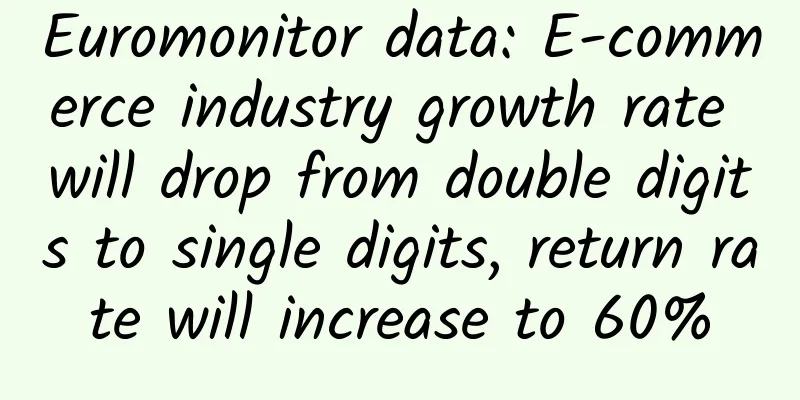Euromonitor data: E-commerce industry growth rate will drop from double digits to single digits, return rate will increase to 60%

|
Chinese e-commerce sellers are struggling to survive as sales growth slows, price wars mount and e-commerce platforms use more aggressive policies to attract increasingly price-conscious consumers. To attract consumers, e-commerce platforms have introduced extreme discounts, influencers and generous return policies, which have indeed enriched the e-commerce industry to a great extent, but at the same time, it is also hurting the sellers who support this industry. “The good days of e-commerce are over,” said Lu Zhenwang, an e-commerce observer who also sells daily necessities for small sellers. “The competition is fierce this year. I don’t think many sellers can survive for another three years.” Profit margins are being squeezed at big e-commerce platforms like Alibaba and JD.com, but so are the thousands of smaller businesses that joined the industry during a decade-long boom that began around 2013. The boom helped e-commerce account for 27% of all retail sales in China, with annual sales of 12 trillion yuan ($1.65 trillion). However, data from research firm Euromonitor shows that as e-commerce industry growth slows, the industry's growth rate will drop from double-digit percentages to single-digit percentages in the next few years. China's retail e-commerce industry growth slows down As a result, people's enthusiasm for participating in shopping festivals has cooled significantly, and the biggest shopping festival, Singles' Day, has now become a "risky" proposition, Lu said. "You don't know how many products you can sell, but you have to build inventory for it," he said. "It's almost impossible to see explosive growth during the shopping festival." Return rates soar As the impact of the industry slowdown begins to show, sellers are stepping up their voices against the negative impact of sales gimmicks. During the "618" period, the founder of women's clothing brand Inman called for restrictions on the platform's "return protection" policy, which forces sellers to bear the cost of returns. The policy was introduced by Pinduoduo in 2021 and was so popular that other platforms followed suit, but it came at a huge cost to sellers, sellers said. Fang Jianhua, founder of Inman, said on social media that after the return protection policy was introduced, the return rate of e-commerce platforms increased to 60%, much higher than the 30% before the policy. He believes that major platforms should not use the "consumer first" policy, which increases the burden on companies. In order to maintain a high ranking in search results, many companies have to sell at prices below cost during multiple shopping festivals. Lu Zhenwang pointed out that the return protection policy has led to a surge in the return rate of categories such as clothing. Sellers said that although the return rate of clothing has always been relatively high, it has increased significantly since the platform no longer requires consumers to bear the return shipping costs. "For every three pieces of clothing you sell, at least two will be returned, and you have to bear the round-trip shipping costs," said Lu Zhenwang. Selling at a loss Davy Huang, business development director at e-commerce consultancy Azoya, said consumers were increasing returns on impulse purchases, making life harder for smaller retailers that don’t have enough cash flow to cover the costs. “But I think the return rate is only a small part of the challenge these companies face,” he said. “They also face high traffic acquisition costs and high costs of working with influencers and anchors.” Retailers are also feeling the impact of factories selling products directly to consumers at factory prices, which has led to some sellers on Pinduoduo operating at a loss for two years, said Shi Heling, professor of economics at Monash University in Melbourne. "They don't have much hope that the selling price will eventually cover their costs, but they have to do it (continue selling through Pinduoduo), otherwise they basically have to close the factory," said Shi Heling. Lu Zhenwang said the peak of the e-commerce industry has created a so-called "involution" effect. "Sales are not growing because there are no new customers," Lu Zhenwang said. "Now there is only competition, competition between platforms and competition between sellers. This has become the new normal in China's e-commerce industry." As of press time, Pinduoduo, JD.com, and Alibaba's Taobao and Tmall have not commented on this. Phoenix Technology |
<<: Faire: Americans willing to spend more when shopping locally
Recommend
The efficacy and function of hemp leaf hydrangea
There are many common Chinese medicinal materials...
Science in the Week: The number of people with pollen allergies in my country may exceed 200 million
We believe that the future is bright and the haze...
The efficacy and function of oyster meat
I don’t know if you are familiar with oyster meat...
What are the benefits of natural wild Ganoderma lucidum?
There are many precious Chinese medicinal materia...
I have wormwood, where can malaria go?
" April 26, 2022 is the 15th National Malari...
The efficacy and function of long leaf coral fruit
After thousands of years of sedimentation and acc...
The efficacy and function of sharp tongue moss
As a traditional Chinese medicine, do you know th...
The efficacy and function of Yisaoguang
I don't know if you have heard of the term &q...
Burdock tea burdock effect
Everyone just knows that burdock can be used to m...
The efficacy and function of Lanbuzheng
Lanbuzheng is a common Chinese medicine of the Ro...
The efficacy, effects and contraindications of licorice should be used correctly in the future
Licorice is a well-known traditional Chinese medi...
Why is Zhengzhou said to be the “hometown” of Tang blue and white porcelain?
"I can proudly say that Zhengzhou is the hom...
Scientists plan to send a second letter to aliens? Hawking once warned: Don't answer
Recently, a piece of news was released that may c...
How to eat Polygonum multiflorum without damaging the liver?
Although Polygonum multiflorum is a very precious...
From a Jiangnan girl at Zhejiang University to a female academician who has built a shield for the country, Chen Wei's wonderful moments
She is a soldier and a scientific researcher... S...







![The efficacy and function of shooting chicken tail [picture]](/upload/images/67ca0e2faf578.webp)

